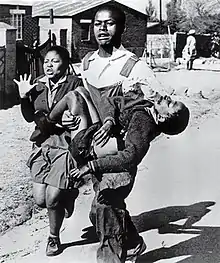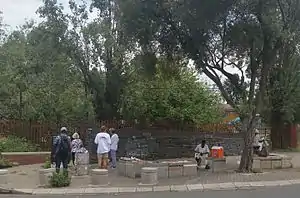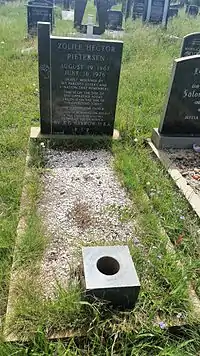Hector Pieterson
Hector Pieterson (19 August 1963 – 16 June 1976) was a South African schoolboy who was shot and killed during the Soweto uprising, when the police opened fire on students protesting the enforcement of teaching in Afrikaans.[1] A news photograph by Sam Nzima of the mortally wounded Pieterson being carried by another Soweto resident while his sister ran next to them was published around the world. The anniversary of his death is designated Youth Day, when South Africans honour young people and bring attention to their needs.

| Part of a series on |
| Apartheid |
|---|
|
Soweto Uprising

On 16 June 1976, school children protested the implementation of Afrikaans and English as dual medium of instruction in secondary schools in a 50:50 basis. This was implemented throughout South Africa regardless of the locally-spoken language and some exams were also written in Afrikaans.[2] Students gathered to peacefully demonstrate, but the crowd soon became intimidated when the police arrived, and started to throw stones.[3]
The police arrived and fired tear gas into the crowd in order to disperse them. There are conflicting accounts of who gave the first command to shoot, but soon children were turning and running in all directions, leaving some children lying wounded on the road.
Although the media often named Pieterson as the first child to die that day, another boy, Hastings Ndlovu, was actually the first child to be shot. But in the case of Hastings, there were no photographers on the scene, and his name was not immediately known.
When Pieterson was shot, he fell on the corner of Moema and Vilakazi Streets. He was picked up by Mbuyisa Makhubo who, together with Pieterson's sister Antoinette (then 17 years old), ran towards Sam Nzima's car. They bundled him in, and journalist Sophie Tema drove him to a nearby clinic where he was pronounced dead.[4] Mbuyisa and Nzima were harassed by the police after the incident and both went into hiding. Mbuyisa's mother told the Truth and Reconciliation Commission that she received a letter from Mbuyisa in 1978 from Nigeria but she has not heard from him since.[5] Pieterson and Hastings Ndlovu are buried at the Avalon Cemetery, Soweto. 10 people died as well and 250 people were injured.
Surname

Since June 1976, Pieterson's surname has been spelled both Peterson and Pietersen by the press but the family gives the correct spelling as Pieterson.[6]
Lawsuit
On 9 August 2002 U.S. lawyer Ed Fagan led a $50bn class action suit by apartheid-era victims against international firms and banks who profited from dealings with the Apartheid regime. Among the plaintiffs in the lawsuit was Dorothy Molefi, Pieterson's mother. The South African government as well as Nelson Mandela, Thabo Mbeki and Desmond Tutu distanced themselves from the lawsuit.[7] Fagan had filed a string of lawsuits over human-rights issues brought in order to force companies to settle. The cases were thrown out in 2004.[8]
Memorial and museum
On 16 June 2002 the Hector Pieterson Museum was opened near the place he was shot in Orlando West, Soweto to honour Pieterson and those who died around the country in the 1976 uprising. Funded by the Department of Environmental Affairs and Tourism (R16 million) and the Johannesburg City Council (R7,2 million), it has become a major tourist attraction. The start of the museum begins with pictures of Pieterson's death. The museum fuses memorabilia with modern technology and cultural history. As of 2010, Pieterson's sister Antoinette, who is seen in the photograph, works at the museum as a tour guide.[9][10]
See also
References
- Hawkins, Stan (2020). "Personas in Rock: "We Will, We Will Rock You"". The Bloomsbury Handbook of Rock Music Research. doi:10.5040/9781501330483.ch-016.
- "The Afrikaans Medium Decree that Led to the Soweto Uprising". ThoughtCo. Retrieved 2018-05-24.
- "Inquiry must be held into Soweto Riot". World. 17 June 1976."Riot – Kruger speaks". World. 17 June 1976.
- Davie, Lucille (9 June 2005). "Museum gathers memories of '76". News Update. City of Johannesburg. Archived from the original on 24 September 2006. Retrieved 27 May 2007.
- "Transcript of a Human Rights Violation Hearing, CASE: GO/O133, 30 April 1996, Day 3". Johannesburg: Truth and Reconciliation Commission. 1996.
- "Soweto Tours | Widest Selection of Johannesburg City and Day Tours". MoAfrika Tours. Archived from the original on 2014-02-27. Retrieved 2018-05-24.
- "Multi-billion dollar Apartheid lawsuit kicks off". Mail & Guardian. 10 August 2002. Archived from the original on 4 March 2016. Retrieved 31 March 2017.
- "Court throws out apartheid cases". BBC News. 29 November 2004.
- Davie, Lucille (14 June 2002). "Hector the famous child whose face is unknown". News Update. City of Johannesburg. Archived from the original on 27 March 2003.
- Davie, Lucille (24 October 2001). "Hector Pieterson gets his memorial". News Update. City of Johannesburg. Archived from the original on 19 May 2007.